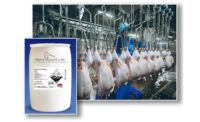Consumers ditch seed oils for animal fats
Seed oil concerns include health risks, the highly processed nature of these oils, performance issues in cooking and flavor preferences.

Animal fat shortenings supplier Coast Packing Co. is unveiling findings from a new consumer survey highlighting a significant shift away from seed oils as a cooking fat.
"Consumers are becoming increasingly aware of the health implications of seed oils, opting instead for more natural, minimally processed alternatives like tallow," said Greg Hozinsky, corporate chef, Coast Packing Co. "Animal fats like tallow offer not just superior flavor but also performance benefits in cooking, such as higher smoke points and better texture in fried foods."
The Coast Packing study posed the question: Do you currently use seed oils (canola, soybean, cottonseed, grape seed, sesame, corn, safflower, rice bran, sunflower oils)? Respondents with a "Yes" were also asked their reasoning for using seed oils. Respondents who replied "No, but I used to" were asked the reasonings for changing from seed oils to alternative cooking fats or shortenings. The survey polled more than 2,000 respondents nationwide.
 Twenty percent of total respondents no longer use seed oils, with 39% citing health risks as their primary reason for this change. Courtesy of Coast Packing Co.
Twenty percent of total respondents no longer use seed oils, with 39% citing health risks as their primary reason for this change. Courtesy of Coast Packing Co.The survey revealed a notable shift among consumers away from seed oils, driven by various factors. Twenty percent of total respondents no longer use seed oils, with 39% citing health risks as their primary reason for this change. Other concerns include the highly processed nature of these oils (33%), performance issues in cooking (26%) and flavor preferences (24%). Additionally, 13% of respondents reported that they had intentionally switched to using animal fats.
Overall, health concerns emerged as the leading factor driving this shift, but the desire for less processed ingredients and better flavor also plays a significant role. In fact, in a 2023 Coast survey on animal fats, half the sample of 1,000 respondents gave a thumbs-up to animal fats for taste and versatility in the kitchen.
"Our surveys over the past eight years and conversations with our customers have given us insights into the changing awareness and attitudes toward animal fats that deserve a place in the American diet," said Eric R. Gustafson, chairman and CEO, Coast Packing Co. "What we're seeing is a shift in preference from highly processed to minimally processed edible oil shortenings, taking us back to basics the way our grandparents used to cook. Lard and beef tallow are minimally processed during the rendering and refining process, avoiding additives such as n-hexane to extract seed oils and hydrogenation. We're pleased to see that consumers nationwide are making the shift towards using animal fat and embracing a healthier way of cooking and baking."
Source: Coast Packing Co.
Looking for a reprint of this article?
From high-res PDFs to custom plaques, order your copy today!





